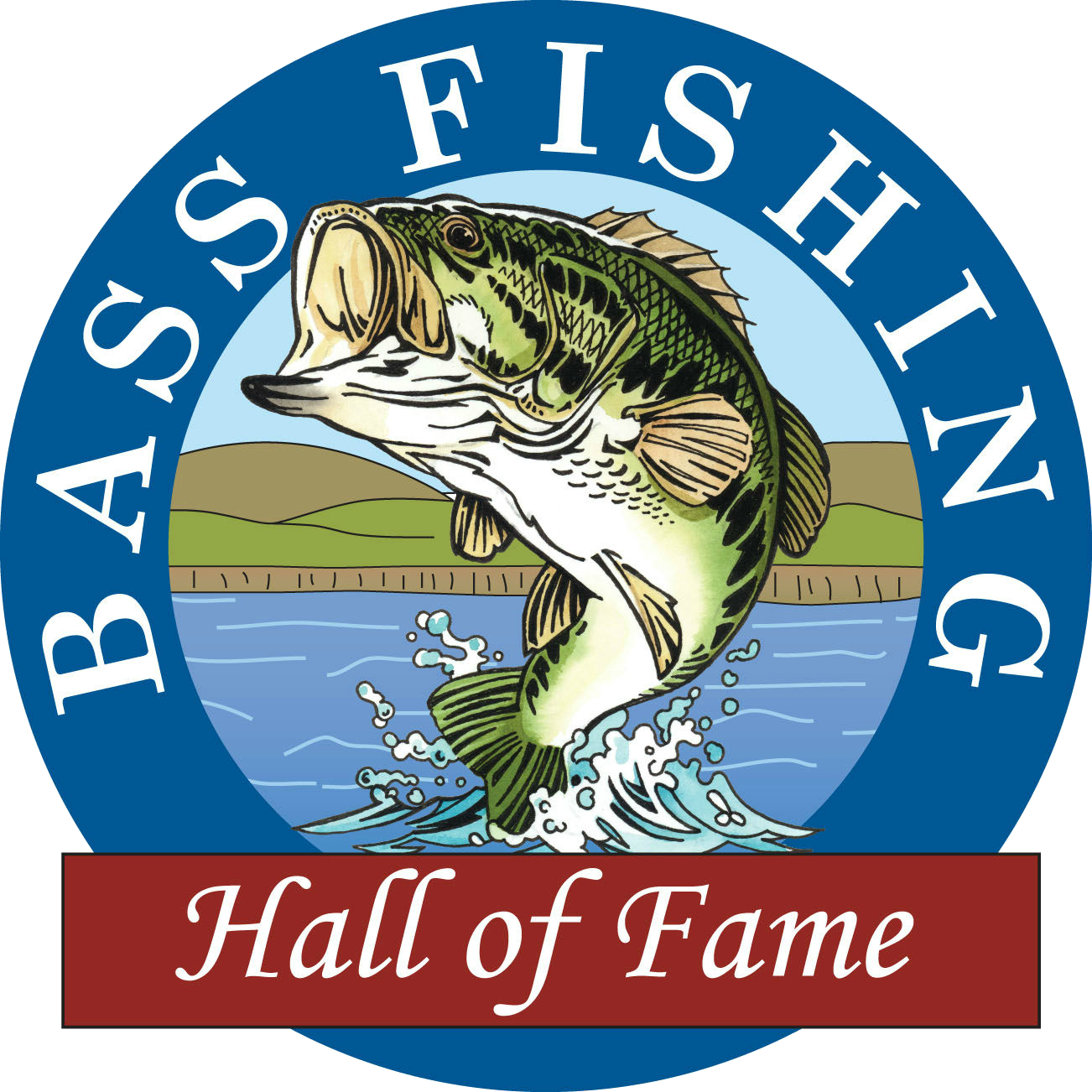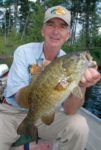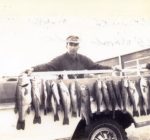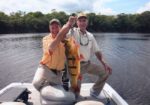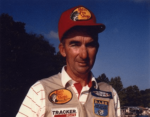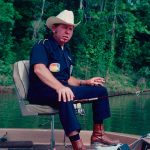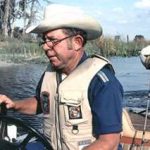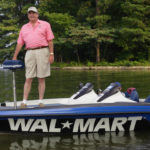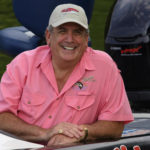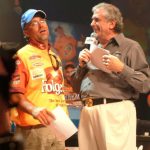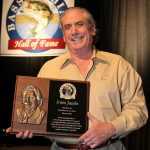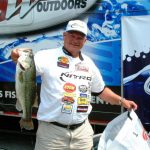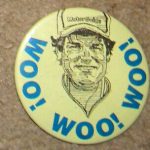Charlie Campbell
Charlie Campbell (1933—2020) After a 15-year career as a schoolteacher and basketball coach (including a State Championship and a Coach of the Year Award), Campbell opened a marine dealership in 1974 in Branson, Missouri. That same year, he won the B.A.S.S. Federation National Championship and placed fifth in the Bassmaster Classic.
In 1977, he went to work for Johnny Morris of Bass Pro Shops in Springfield, Missouri, where he helped design the Bass Tracker Boat.
Campbell’s fishing career started by guiding on Bull Shoals Lake in 1958 during summers and after school. He developed the “Charlie Campbell CC Spinner Bait,” and his successes in topwater fishing helped bring back the Zara Spook.
In addition to fishing five Classics, he won a total of 67 tournaments on a variety of trails. He has been inducted into the Drury College Sports Hall of Fame and the Missouri Sports Hall of Fame, and he was named an “Outstanding Missourian” by the state’s House of Representatives.
Mr. Campbell passed away April 19, 2020
Charlie Campbell
Tim Tucker (1957 – 2007)— During his 25-year career as an outdoor writer, Tim Tucker was easily one of the most prolific, influential and widely published journalists in the fishing world.
A senior writer for Bassmaster and B.A.S.S. Times magazines from the early 1980s, Tucker’s articles and photos were included in almost every issue of both publications. He also was published in Field & Stream, Outdoor Life, In-Fisherman and a host of other publications. He wrote syndicated outdoor columns for 33 newspapers, published a bimonthly newsletter on the business of bass fishing and co-hosted a radio program with angler and industry insider Gary Giudice for many years.
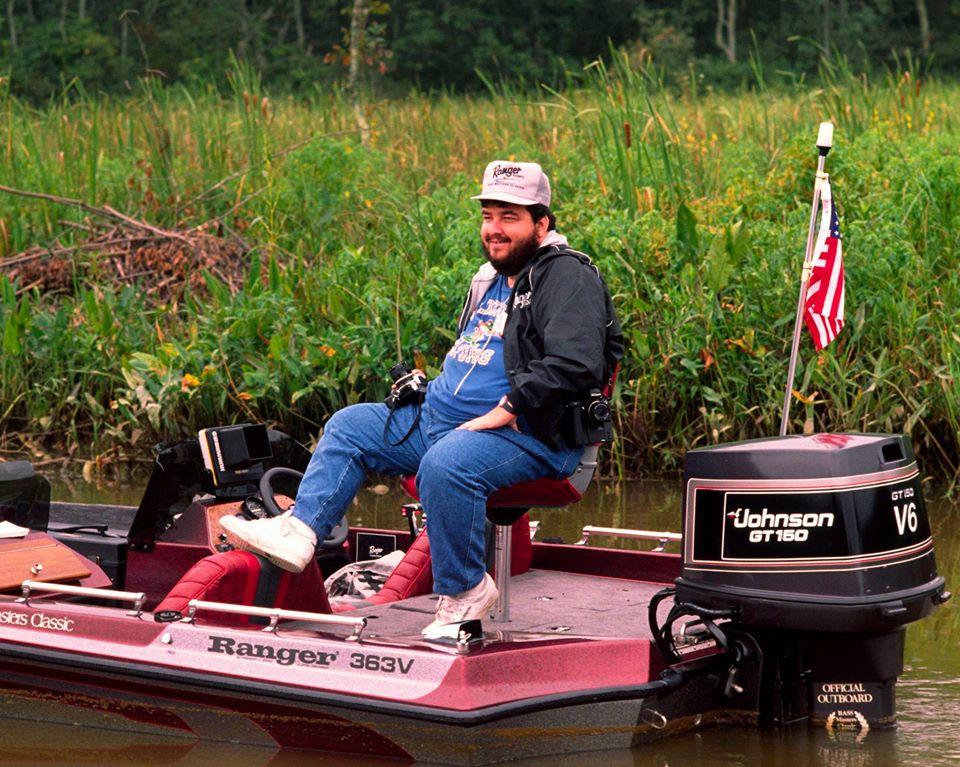
Tucker had a passion for writing that began in high school, when he won the Quill & Scroll national writing award for students. That was the first of more than 100 awards he received for his writing and photography over the years.
He got a job as a copy boy for his hometown newspaper, The Palm Beach Post, and worked his way up to outdoor writer. In that role, he developed a relationship with Roland Martin, the nine-time Bassmaster Angler of the Year who lived and worked at Clewiston, Florida, on Lake Okeechobee, an easy drive from West Palm Beach.
With Martin vouching for him, Tucker launched his freelance writing career.
“Once he got started, he really got rolling,” said Martin. “He came along at the perfect time for me at the pinnacle of my success. He chronicled all that.”
Tucker focused the first of his eight books on his friend: Roland Martin’s 101 Bass-Catching Secrets. Other successful titles include, Bill Dance on Largemouth Bass, Bill Dance on Crappie Fishing, Advanced Shiner Fishing Techniques, Diary of a Bass Pro: A Year on the Inside of Fishing’s Fast Track with Joe Thomas, Advanced Shiner Fishing Techniques, Secrets of America’s Best Bass Pros and More Secrets of America’s Best Bass Pros.
For two decades, Tucker attended as many professional tournaments on the B.A.S.S. circuit as he could, including those he was not assigned to cover. He valued the events as treasure troves of ideas and inspiration that would help weekend anglers catch more bass.
His articles helped launch the careers of several of the sport’s most successful pro anglers. He mentored several of them on how to build a career around fishing, and he led seminars for pros to teach them how to acquire, serve and keep sponsors.
Tucker was dedicated to the craft of journalism. He was an active member and a past president of the Southeastern Outdoor Writers Association (SEOPA), and he regularly helped other journalists make their way in covering the sport.
Tucker died in an automobile accident in Gainesville, Florida, in July 2007. He was 50 years old. Among the many eulogies from his friends in the sport and industry of bass fishing, pro angler Bernie Schultz of Gainesville captured the essence of his impact on bass fishing. “There will never be another Tim Tucker,” he said. “He helped shape the sport.”
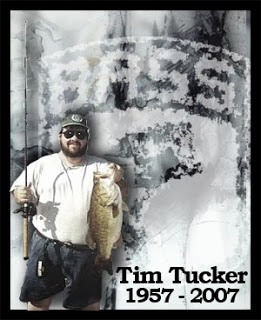
Tucker was posthumously awarded the B.A.S.S. Outstanding Achievement Award at the 2008 Bassmaster Classic in Greenville, S.C. The award was accepted by his wife, Darlene, and their twin children, Rachel and Kyle.
Tim Tucker
Steve Price has been a full-time writer and photojournalist since 1973 and a writer/photographer for Bassmaster since 1974. During his writing career, Price has sold more than 3,000 magazine articles, primarily about bass fishing, to such publications as: Field & Stream; Outdoor Life; Sports Afield; National Geographic; Rand McNally; Southern Living and many more.
Price served as Outdoor Editor for Southern Living magazine, which had a circulation of 3 million, from 1975-78. He was a syndicated newspaper columnist for 10 years (1986-96), a radio program producer/host (1990-1994) and is the author of five books about bass fishing.
His photography has been recognized both nationally and internationally and Steve Price has been a semi-finalist and finalist in the worldwide “Wildlife Photographer of the Year” competition sponsored by British Petroleum (nearly 20,000 entries annually). His photography has been used in books and promotions worldwide and by organizations such as: National Geographic Society; Reader’s Digest; Associated Press; Game Conservation International; Rocky Mountain Elk Foundation; General Motors; Toyota and the Brunswick Corp., among others.
In addition, Mr. Price has attended every Bassmaster Classic since 1976 as a press writer/photographer, having written about and photographed the legends of bass fishing during this time.
Steve Price
John Powell (1929 – 2007) – John Powell knew from a very early age what it meant to work hard. He grew up on what he called a “rawhide” farm in Elmore County, Alabama, just northeast of Montgomery. Like his father before him, he fished commercially in lakes and rivers along the Coosa and Tallapoosa rivers near his home.
Powell joined the Army Air Corps in 1947. In his 22-year service in the Air Force, he served in both the Korean War and the Vietnam War, rising to the rank of Chief Master Sergeant.
While still serving in the Air Force, Powell returned to his native Alabama and decided to check out the new tournament organization established in nearby Montgomery, the Bass Anglers Sportsman Society, by his longtime friend, B.A.S.S. founder Ray Scott.
Scott loaned Powell a V-hull plywood boat so he could fish the second Bassmaster tournament, the Dixie Invitational on Smith Lake, Alabama, in 1967. Scott secured a more seaworthy Chrysler boat for Powell to fish additional events, and he used it to post his first win, claiming the 1968 Eufaula National on Lake Eufaula, Alabama, with a stunning catch of 132 pounds.
Hooked on tournament fishing, Powell retired from military service in 1969 and began fishing professionally, becoming the first to win back-to-back tournaments, in 1971 on Sam Rayburn and Table Rock lakes. Powell qualified for six Bassmaster Classic championships.
Powell was one of the first members of B.A.S.S. and one of its early tournament trail stars. He shared the spotlight with men like Bill Dance and Tom Mann, and he was winning tournaments before Roland Martin arrived on the scene. He was frequently near the top of the standings, finishing in the Top 50 in more than half the 90 tournaments he fished, including 32 Top 20s and 16 finishes in the Top 10, counting his three victories.
Along with Martin, he was a popular speaker on the Bassmaster Seminar Circuit, on which they, along with Scott, Bob Cobb and Harold Sharp, toured the nation giving presentations on bass fishing to packed auditoriums in 101 cities over a two-year period. Powell believed he was the first pro angler at the beginning of B.A.S.S. to earn a sponsor contract.
He was an early innovator of shallow-water fishing with plastic worms, which were gaining popularity in the 1970s after Mann’s Bait Co. hit the market with the Jelly Worm. Powell regularly told anglers in the boat with him to set the hook quickly when they felt a bite instead of waiting. “That first tap you feel is the bass sucking in your worm,” he would tell his listeners. “The second tap is the fish spitting it out. The third tap is me tapping you on the shoulder to tell you that you missed him!”
John Powell
Irwin L. Jacobs (1941-2019) – Irwin Jacobs was a highly successful businessman in a variety of industries, but his passion for bass fishing was best embodied through his longtime leadership of the FLW Outdoors and ownership of Genmar Industries, the world’s largest privately-held recreational boat builder. He was inducted in to the Bass Fishing Hall of Fame in 2010.
Jacobs was raised in Minneapolis, very briefly attended the University of Minnesota, and literally embodied the American “rags to riches” story. At 8 years old, he started working for his father’s Northwestern Bag Company, collecting and reselling burlap sacks. In 1973, Jacobs founded COMB (“Close-out Merchandise Buyers”), a catalog-based mail-order retailer, and along with several cable television magnates he later created the Cable Value Network, an innovative shopping channel later purchased by QVC. Jacobs, based in Minneapolis, became wealthy by taking big stakes in Fortune 500, usually to unlock value by breaking them up thus earning the nickname “Irv the Liquidator.” He was a relentlessly bold and aggressive businessman, and many of his ventures were taken in collaboration with friend Carl Pohlad. Together they were involved in corporate acquisitions of the Grain Belt Brewery, Disney and Kaiser Steel. Along with Pohlad and others, Jacobs owned a portion of the Minnesota Vikings for a period of time.
Gemar, which included iconic bass boat brands like Ranger Boats, Stratos and Javelin, became a large player within Jacobs’ portfolio, and led him to purchase and operate FLW Outdoors, the world’s largest fishing tournament organization with annual awards of millions of dollars for anglers in tournament circuits targeting species including not just bass, but also walleye, redfish, kingfish and striped bass. Those circuits ranged from the tour-level down through the weekend angler. In the latter category, FLW owned the Red Man Tournament Trail (later renamed the BFL, or “Bass Fishing League”) and ultimately took on a portion of the Bass Federation.
His decision to purchase what until then had been known as Operation Bass was an attempt to fully tap into the buying power of the nation’s 50 million fishing enthusiasts. He later renamed the operations FLW Outdoors after the legendary founder of Ranger Boats, Forrest L. Wood. Jacobs saw FLW Outdoors tournaments as a unique and powerful opportunity to communicate with a huge consumer group that had never been pursued. In 1997, Jacobs hooked the giant retailer, Wal-Mart, as a title sponsor, which eventually allowed Jacobs to court the world’s leading consumer products companies. As a result of Jacobs’ efforts, more than 50 leading consumer brands, including brands owned by global powerhouses BP, General Motors, Kellogg’s, and Procter & Gamble, sponsored FLW Outdoors tournaments. In 2007, FLW Outdoors made history by awarding the sport’s first $1 million check to Arkansas angler Scott Suggs when he won the Forrest Wood Cup championship.
In addition to his accomplishments in sport of tournament fishing and the business world more broadly, Jacobs was a devoted and generous philanthropist. He underwrote and served as chairman of the 1991 International Summer Special Olympics Games, which were held in Minneapolis/St. Paul. Additionally, he personally funded the building, furnishing and overall operations of Dells Place, a group home for developmentally challenged individuals; Functional Industries, an occupational workshop for physically and mentally disabled individuals; and The Art Center of Minnesota. Additionally, Jacobs supported several other local and nonprofit organizations benefiting the arts, disabled, developmentally challenged and homeless.
- Irwin Jacobs presents Scott Suggs
Irwin Jacobs
Woo Daves — Near the end of his long career in professional fishing, Woo Daves won the 2000 Bassmaster Classic in Chicago. In all, he has competed in 17 Classics, finishing among the Top 5 in six of those events. He has won four Bassmaster tournaments, including the 2002 New York Open.
Daves is known as a relentless promoter of bass fishing, spending the entire year after his Classic win presenting seminars and making appearances to represent his sponsors and the sport.
One of the first to establish a close connection between NASCAR and bass fishing, Daves established an annual charity tournament involving NASCAR legends and bass anglers in 1991. The tournaments generate funds for Super Kids, a Virginia-based organization benefiting the mentally challenged.
